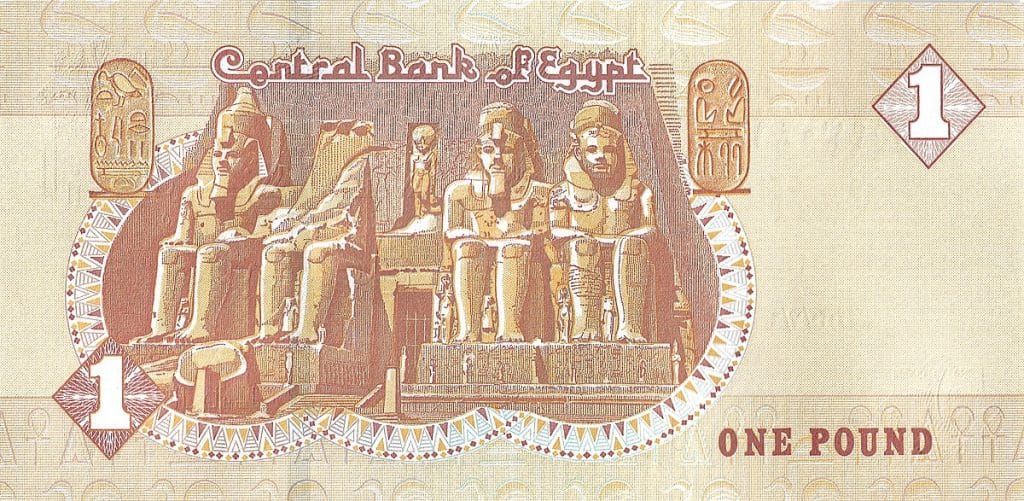A 1 Egyptian pound note.
The social contract between Egyptian President Abdul Fatah al-Sisi and Egyptians is in question. Egypt has a long history of trading political freedoms for socio-economic benefits. With Egypt's economy in a deep slump, the question is whether Egyptians continue to believe in al-Sisi's justifications.
Historic low
In recent months, Egypt's economy has been in dire straits. The country is struggling with sky-high inflation. The inflation was 21.9% last month. By comparison, exactly a year ago in December 2021, before the war in Ukraine, inflation was around 6.5%. Last week, 1 US dollar was worth around 32 Egyptian pounds, a historic low.
Basic foods, such as cooking oil and eggs, have doubled in price. Shelves in supermarkets remain empty and many imported products are no longer available. The tourism industry, which was slowly picking up after the 2011 Revolution, has also collapsed due to the corona crisis and the war in Ukraine.
Poor Egyptians are particularly affected by the economic malaise. Egypt has relatively high levels of poverty: some two-thirds of Egyptians live below the poverty line. The current economic crisis could potentially fuel this already worrying figure.
War in Ukraine
Recently, the director of the Central Bank of Egypt (CBE) was sacked by al-Sisi, a sign that the Egyptian president himself is also at a loss. Al-Sisi places the causes for the economic malaise outside himself, blaming it on the war in Ukraine. Egypt is one of the world's largest grain importers, and some 82% of Egypt's grain imports in recent years came from Russia and Ukraine. With these countries no longer supplying, grain prices are being driven up.
Economic policy questions
Yet many Egyptians believe that the regime's mismanagement is also a determining factor in the current economic woes. On social media, Egyptians are remarkably critical of their president's policies. Analysts also argue that the war in Ukraine has mostly exposed existing problems in the Egyptian economy. For instance, it is suggested that the Central Bank of Egypt's artificial maintenance of a high exchange rate for the Egyptian pound is a major reason for the meteoric devaluation. Moreover, economists question the Egyptian regime's high spending on prestigious construction projects, which bring in little money.
"Too big to fail"
Most recently, the International Monetary Fund (IMF) approved another $3bn loan to Egypt, subject to "monetary policy aimed at gradually reducing inflation." Egypt's foreign debt has quadrupled in the last decade. This while Egypt is not complying with the loans' stated conditions, such as transparency, human rights protection and anti-corruption.
The West has consistently supported Egypt's mounting debts to the International Monetary Fund, the World Bank and the European Bank for Reconstruction and Development. Western support for al-Sisi stems from the belief that Egypt is simply "too big to fail". The West is apprehensive about extremism, civil war, and consequent increases in migration in the region. Al-Sisi may be a dictator, but he is a stable dictator, the West reasons.
Megalomaniac prestige projects
Instead of working on the IMF's stated conditions, such as protecting human rights and fighting corruption, al-Sisi mainly invests in huge construction projects. The Egyptian regime is spending large sums of money on megalomaniacal prestige projects, building entire cities out of the ground, such as a new administrative capital and New Alamein City on the north coast. The new construction is often unaffordable for the many Egyptians living in poverty or even homeless. Economists also warn that such construction projects do not yield a return on investment.
The IMF has ordered Egypt to bring back this kind of public investment and privatise state shares. The big question now is whether the IMF will hold Egypt to these promises. At a conference in October, al-Sisi promised that construction work on his mega-projects would continue. In the past, the IMF has always continued to lend Egypt money despite the Egyptian regime's failure to comply with the conditions set.
Harsh repression
If the IMF does not hold al-Sisi to his promises, there is still the possibility of the Egyptian people expressing dissatisfaction with the broken social contract. Even that, however, seems unlikely. Al-Sisi has so far successfully stifled critical voices through harsh repression. Civil society has shrunk considerably under al-Sisi. Recently, Reporters Without Borders ranked Egypt 168 out of 180 ranked countries. Egypt has at least 60,000 political prisoners.
Sources: AP News, Al Jazeera 1, Al Jazeera 2, Al Jazeera 3, Al Jazeera 4, Al Jazeera Studies, NPO Radio1
Image: Wikimedia Commons





